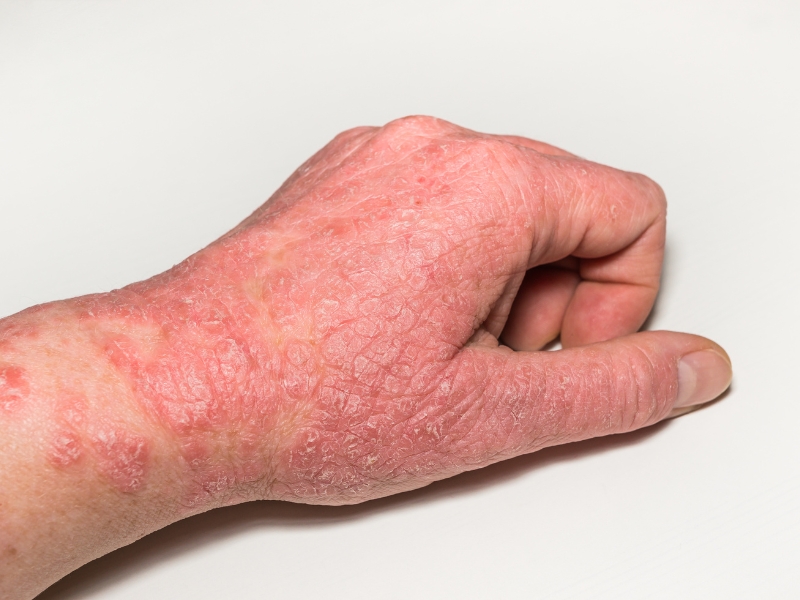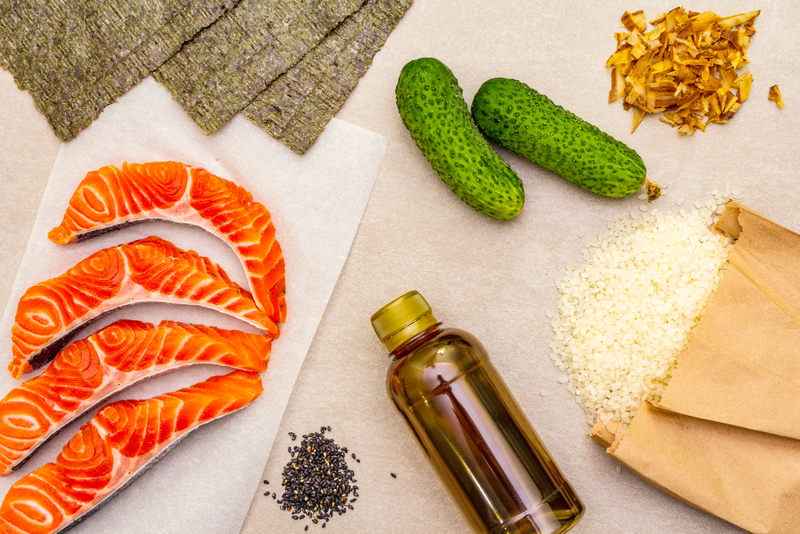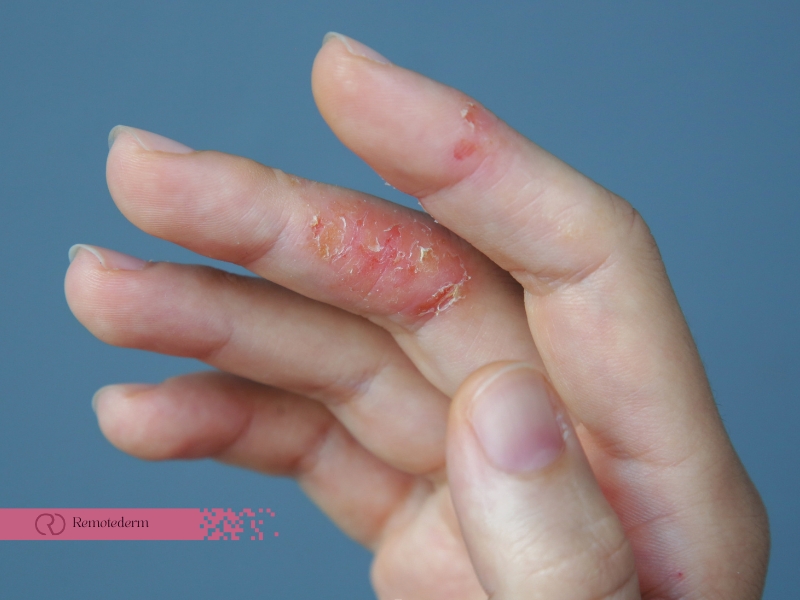Eczema on hands is a highly annoying skin condition that is very common. Itching, redness, and discomfort are the symptoms of the condition, which have a great impact on daily activities. This article is going to explain the causes, symptoms, and most effective treatment of eczema on hands, thereby helping you to find relief and improve your skin health.
Understanding Eczema on Hands
Eczema which medically is referred to as atopic dermatitis, is a long-term skin ailment with the main symptoms being inflammation, itching, and redness. When it manifests itself on hands, it can be very annoying since the hands usually come in contact with irritants and allergens very often.
Causes of Hand Eczema
Several factors can contribute to the development of eczema on hands:
- Eczema or other allergic diseases may be inherited in the family, increasing the probability of developing eczema.
- Indirect exposure through soaps, detergents, and chemicals may be frequent and lead to eczema.
- Emotional stress can trigger or worsen eczema symptoms.
- Dry and cold weather can exacerbate eczema.
Symptoms of Hand Eczema
Hand eczema, a chronic skin condition which is characterized by red inflamed skin, sometimes comes with burning, itchy sensations, and dry and scaly patches, cracked or even bleeding skin, as well as blisters. When this condition is at its most extreme, everyday activities become almost impossible and it can bring about a lot of pain. If home cures do not work and the symptoms either last or get worse, the doctor should be visited as a matter of urgency.

How to Treat Eczema on Hands?
Hand eczema management is a way of combining the therapies of medical treatments, changing to a healthier lifestyle, and preventive measures. Finding out how to cure eczema on hands properly can help on the way to maintaining your skin.
Medical Treatments
Treating hand eczema is often a multi-faceted process through the application of combined therapies to cope with the symptoms and avoid the flares. Here are some common medical treatments:
- Topical steroids: They are used to reduce inflammation and itching. Compliance with the instructions is necessary for successful treatment by a dermatologist.
- Emollients: By applying thick creams and ointments, you can seal in the moisture and prevent skin damage.
- Calcineurin Inhibitors: These medicines are used for moderate-to-severe eczema. They decrease the skin inflammation but do not cause any side effects that steroids do.
- Phototherapy: Systematic exposure to UV light can help disintegrate the eczema inflammation.
Home Remedies and Lifestyle Changes
Making basic changes at home and in your everyday life can manage hand eczema and prevent the latter. Below some tips are given:
- Moisturize Regularly: Choose only hypoallergenic, non-fragrant moisturizers and apply them on many occasions in a day.
- Avoid Irritants: Use cleaning products carefully when wearing gloves, especially in cold weather.
- Gentle Soaps: Choose non-perfumed and non-harsh soap and detergents.
- Stress: Learn relaxation methods such as yoga, meditation, or controlled breath exercises.
How to Get Rid of Eczema on Hands
Following a consistent treatment plan and being proactive will help control eczema and prevent the relapse of the condition. However, the right way to relieve eczema on hands can give immediate comfort and long-term control.
Preventive Measures
Through consistently proactive measures, it is possible to keep hand eczema flare-ups in check, as well as to prevent them from happening. Explore and analyze the possibilities of triggers by regularly keeping a diary for tracking the incidence of flare-ups and possible causes. Take a balanced diet that has omega-3 fatty acids to help in the reduction of inflammation. Water intake makes up for inside hydration, thus keeping the skin hydrated. Constant check-ups with a dermatologist, which is sometimes done online, add value to the condition and might be utilized to adjust the treatment.

How to Relieve Eczema on Hands
For just a bit of time quickly, positive results from eczema symptoms can make big changes in life.
Quick Relief Tips
Apply cool compresses on the hand’s eczema for immediate relieving of the symptoms. These will reduce the itching and inflammation of the skin. Anti-itch lotions with hydrocortisone could be bought at the pharmacy and temporarily used to relieve the symptoms. To avoid scratching and wearing your nails short, use cotton gloves at night to cover them if you can’t keep them short.
Long-Term Management Strategies
Effective and continuous management is an important condition for the control of eczema and for preventing its aggravation. It is essential to know the ways to ease eczema on hands in order to gain instant relief and also to be able to control it in the long run.
Skin Care Routine
Proper skin care is very important for people suffering from hand eczema in order to keep hand eczema under control. Consistency is key; follow these steps to help keep your skin healthy and reduce flare-ups.
- Skin Care Routine: Establish a consistent routine with gentle cleansing and regular moisturizing.
- Protective Measures: Use gloves to protect your hands from irritants and extreme weather conditions.
- Healthy Lifestyle: Maintain a healthy lifestyle with a balanced diet, regular exercise, and adequate sleep.
Canada-Specific Considerations
Living in Canada, a hand eczema patient may have to deal with the specific problems of changing seasons and temperatures, which in turn affects the treatment.
Tips for Canadians
For instant relief from features of hand eczema, the application of cool compresses to the areas of itching will help stop inflammation. The hydrocortisone anti-itch creams available over the counter help relieve itching for a limited time. To stay away from further irritation, firstly, avoid scratching and it can be achieved by keeping your nails short and wearing cotton gloves while you sleep at night. You can always consult a dermatologist for tailored approaches to your specific case. Online eczema dermatologist can also be useful if you need immediate access to a dermatologist or live in a remote area.
Final Thoughts
Being on the hands can annoy eczema, but the approach, when properly applied, can help you control and even significantly reduce the eczema symptoms. Through knowing the causes, recognizing the triggers, and implementing the effective treatment strategies, you can have healthy skin and a better quality of life. Approach with an online eczema specialist to have a treatment plan made just for you.
FAQs
1. Can diet affect eczema on hands?
Certain meals are often the reasons for the eczema flare-ups. Omega-3 fat-rich foods and consuming less processed food can be of help in managing the symptoms.
2. Is eczema on hands contagious?
No, eczema is not a contagious disease. Through physical contact, eczema is not possible to be transmitted from one person to another.
3. Can stress cause eczema on hands?
Stress can be either the cause or the main problem of eczema. Control of stress by means of relaxation methods would be a help for the reduction of the phenomena.
4. Are there any natural remedies for hand eczema?
Natural treatments including coconut oil, aloe vera, and oatmeal baths can calm eczema symptoms. However, they should be used along with the main medical treatment, not instead of it.
